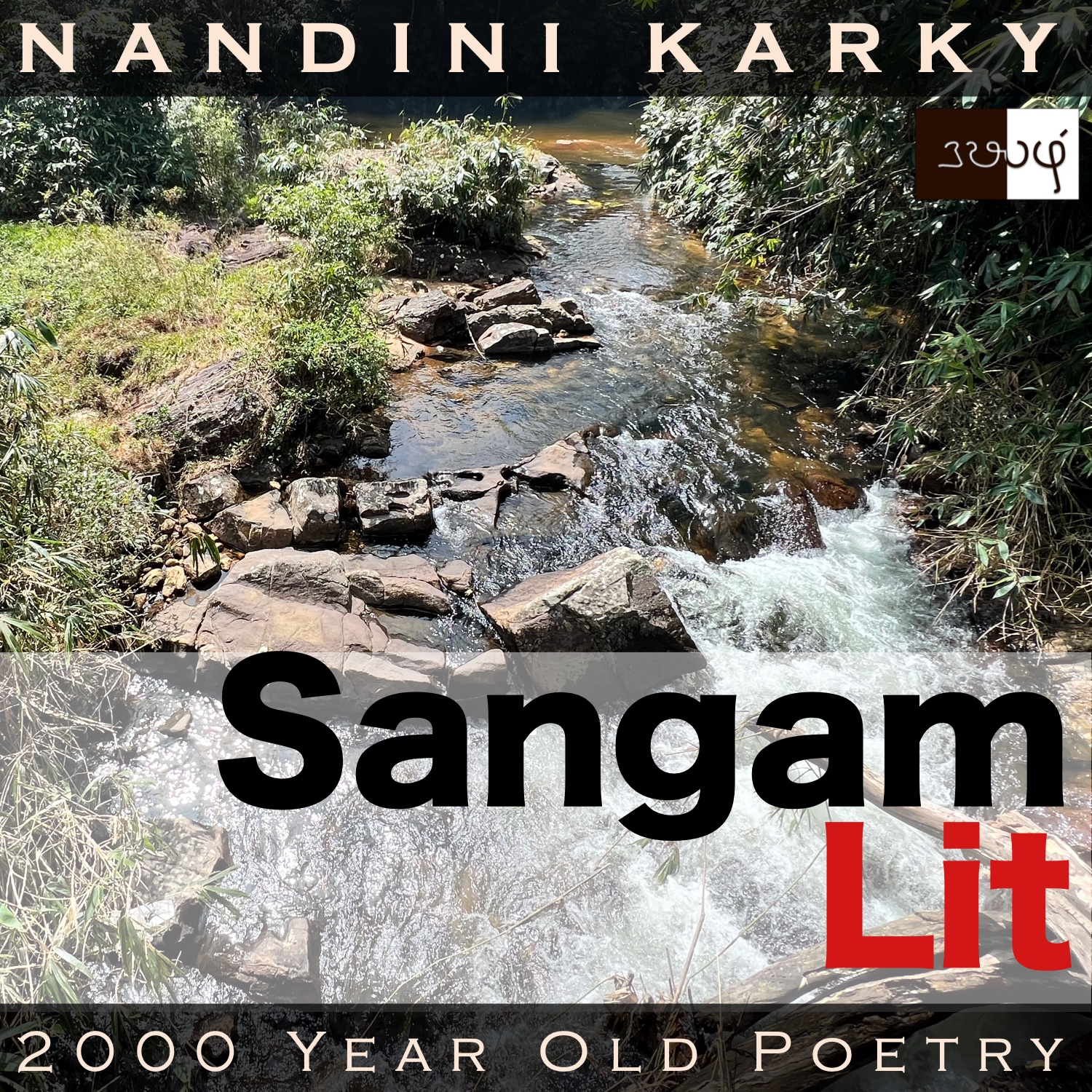Podcast: Play in new window | Download
Subscribe: Apple Podcasts | Spotify | Amazon Music | Android | iHeartRadio | Email | TuneIn | RSS | More

In this episode, we relish a unique way of scolding a person, as portrayed in Sangam Literary work, Kurunthogai 327, penned by Amoovanaar. The verse is situated in the mountains of ‘Kurinji’ and speaks in the voice of the lady to a river, passing on a pointed message to the man, listening nearby.
நல்கின் வாழும் நல்கூர்ந்தோர் வயின்
நயன் இலர் ஆகுதல் நன்று என உணர்ந்த
குன்ற நாடன் தன்னினும் நன்றும்,
நின் நிலை கொடிதால், தீய கலுழி,
நம் மனை மடமகள் இன்ன மென்மைச்
சாயலள் அளியள் என்னாய்,
வாழை தந்தனையால் சிலம்பு புல் எனவே.
‘You are more cruel than the man I love’ is the sharp statement in this one. With abstraction begins the verse in ‘நல்கின் வாழும் நல்கூர்ந்தோர்’ meaning ‘those who look up in yearning will live when grace is rendered unto them’. The quality of ‘lacking affection’ can be seen in ‘நயன் இலர் ஆகுதல்’. The phrase ‘நின் நிலை கொடிதால்’ meaning ‘your state is more wicked’ echoes the core theme. We know who is being addressed when we see ‘தீய கலுழி’ meaning ‘cruel wild river’. Ending with the words ‘வாழை தந்தனையால் சிலம்பு புல் எனவே’ meaning ‘you brought down the plantain tree making the hill dull’, the verse intrigues our curiosity.
What a curious conversation with a river! The context reveals that the man and lady were leading a love relationship and the man was trysting with the lady for a long while. Observing that he was intent only in that temporary pleasure, the lady decides it is time to pass on a hint to him about his attitude. One day, as she is sitting on the shore of a river, she sees the man arriving but pretending not to notice him, while making sure he’s in earshot, the lady says to the river, “The man from the mountains thinks that it’s right to be without concern towards the impoverished, who live by looking up to his grace. But he is better than you, for sure. For your state is even more cruel, O evil river, for without thinking that she is to be pitied, and a gentle one in the resemblance of the young maiden, who lives by your shores, you have slashed and brought down the banana tree and made the hill lose its lustre!” With these words, the lady conveys to the listening man that he should show more kindness to her and seek her hand in marriage.
Time to decode these cryptic words! The lady starts by talking in an abstract fashion about people who think that they need not be kind to those poor souls who look up in yearning to them. Revealing that she’s talking about none other than the man from the mountains, the lady then turns and says to the river that it seems to be worse than the man in its cruelty. Proof for this she renders by pointing to the plantain tree that the river had dragged down from the hills, without thinking that tree too was a gentle one, in the resemblance of the lady, who lived by the river’s shores! The poor plantain, like how the lady looked up to the man, looked up to the river, to sustain it. Instead of doing that, the river severed the tree and dragged it down. At least, the man brought no harm to me, the lady seems to say to the river, in a convoluted expression of appreciation for him!
Interesting tactic by the lady in scolding a river and indirectly blaming the man for his lack of concern by surprisingly praising him! The listening man would no doubt get the message that he needs to be kinder to the lady and think beyond the pleasures of her company and take steps for their permanent happiness. How do they come up with these interesting ways of persuading someone? In the end, it may only be ‘marry me, marry me’, but how many, many different ways of saying it! Truly mind bending is the creativity of the Sangam poets that tells us it does not matter how small your field may be, all you need is the innate human spirit of invention to create magic therein!




Share your thoughts...